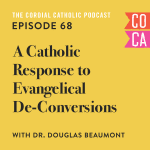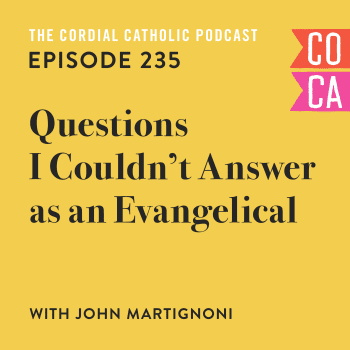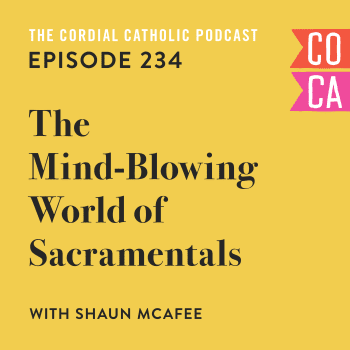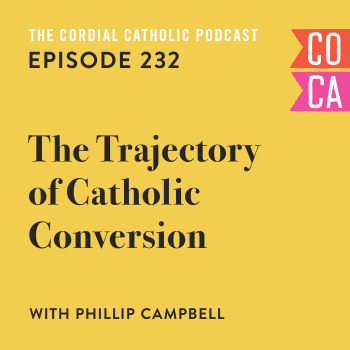
This week, I had the privilege of sitting down to talk to Dr. Douglas Beaumont about the recent spate of Evangelical de-conversions.
In addition to many others before them, popular and often prominent Evangelical Christians like Jon Steingard from the band Hawk Nelson, YouTubers Rhett and Link, author Joshua Harris, and Hillsongs worship leader Marty Sampson have famously de-converted from Christianity and describe themselves as anything from agnostic to atheist.
Dr. Beaumont is something of an expert on conversions—like me, he was an Evangelical who became Catholic—but, unlike me, Dr. Beaumont has written research-based articles on exactly what it takes to convert and, as it turns out, written about some of the recent Evangelical de-conversions, too.
We had a fantastic discussion. And, I feel like, an important one too.
Because as I’ve listened, and read, and processed some of the most recent Evangelical de-conversion stories I keep coming back to something I, myself, came to understand deeply during my own conversion process and that is: the Catholic answer.
I couldn’t shake the feeling, after every story that I read, that Evangelicals like Jon Steingard from Hawk Nelson, YouTubers Rhett and Link, former Hillsongs worship leader Marty Sampson, and others just like these, were missing something fundamental in their experience of Christianity.
And, as a result, their de-conversions were missing an important counter-point. An important response.
A response that demonstrates empathy (not apathy), points out the clear place and position of some of these seemingly enormous challenges to Christian belief, and points to a different way of understanding the life of faith and a fundamentally different way of doing Christianity.
A Catholic response.
1. De-Conversions Happen for Lots of Reasons
First, it’s worth acknowledging that de-conversions (like conversions) happen for lots of different reasons.
Someone doesn’t just wake up one day, or encounter one piece of evidence or an aberration in their worldview (as Dr. Beaumont describes it) and become an ex-evangelical.
Instead, evidence or aberrations begin to mount. Someone may encounter something in their worldview, in their faith life, that doesn’t make sense with what they already know. It could be a point of theology, or philosophy, or some kind of lived experience. Or it could be, and often is, a combination of all three.
Whatever the reason, even though there is a worthy Catholic response to some of the larger challenges many Evangelical de-conversion stories have in common, there isn’t a one-size-fits-all response to Christians who quit the faith.
Any response, as Dr. Beaumont points out, needs to be, first of all, highly personal.
A lifelong Christian who is leaving the faith because of seemingly unsurmountable problems with suffering or evil or the hiddenness of God needs to be accompanied and presented with thoughtful, Catholic answers in a much different way than an outspoken ex-evangelical who objects to what they may see as the hateful teaching of the Church around marriage or family.
Prayer, above all else, needs to accompany evangelism. No one sets out to become an Evangelical only to quit; the benefit of the doubt, and compassion for the doubter, needs to be foremost in our approaches.
2. Minority Beliefs Shouldn’t Undermine Your Christianity
The first response to some of the challenges undermining Evangelical Christianity is to note, as Dr. Beaumont does, that some of these beliefs, some of these aberrations in the Evangelical Christian worldview, are really and truly minority beliefs.
In other words, some of the problems encountered by Evangelicals, which ultimately lead to their de-conversions, are not widely held elsewhere in the Christian Church. This is true historically and even in the present-day.
As a way of example, Dr. Beaumont brings up Young Earth Creationism.
The idea that the account of creation found in the Old Testament book of Genesis is a literal account of how God made the Earth isn’t a new view. As Dr. Beaumont points out even St. Augustine wrote about various interpretations of Genesis and the creation of the world. But it’s important to note that this view, for example, is simply not widely held.
That’s worth underscoring: That just because it seems like everyone around you believes a certain piece of theology or doctrine doesn’t mean that everyone does, or even that most Christians do.
On the point of Young Earth Creationism, says Dr. Beaumont, this view is held by only a slim minority of Christians around the world and throughout history and it follows that if this is something that’s causing Evangelical Christians to de-convert it needs to be looked at very closely.
Right or wrong, it is a minority belief and these kinds of beliefs should be recognized as such because, time and again, Evangelicals are leaving the faith for challenges which are, really and truly, only challenges for the small sliver of Christianity that they are a part of.
To the Catholic, reconciling the belief in a literal Genesis doesn’t pose the same problem. The Catholic Church invites us to interpret Genesis literally but also allows Catholics to believe in the God-ordained creation of the world through evolutionary mechanisms.
On this issue, and many others, the Catholic answer is simply missing from the Evangelical de-conversion conversation.
But it should be on the table, especially when views that challenge the Evangelical worldview, like a literal Genesis, are not central to most Christians around the world. Putting that in context, especially when its driving Christians from the faith, is crucial.
3. Another Way of Interpreting the Bible
The second major challenge cited by nearly every ex-evangelical you’ll come across is the problem of the interpretation of Scripture.
For me, and Doug, and thousands of other converts to Catholicism this played a major role as well.
A simple look around at the landscape of Evangelical Christianity makes it clear that different interpretations of the same Scriptures are bountiful. Evangelical Christians simply can’t agree on what the Bible means and it’s not only on small matters either.
On enormous, life-altering issues like what it means to be saved, what baptism does, the role of women in ministry, what marriage is, and simply how to be a good Christian and follow Christ—the Evangelical church presents hundreds if not thousands of different answers to these questions.
There’s simply no, singular way to interpret the Bible and this leads to a kind of crazy fracturing of the Evangelical church.
This is why, in no small part, Evangelical Bible scholars and pastors sometimes become Catholic—my fantastic conversion with Dr. John Bergsma, a former Reformed pastor, is a great example of this.
But even though many Evangelical Christians cite this problem as a major catalyst in their de-conversion there is another way and a robust, ancient, historic Catholic response.
It’s called the Magisterium and it’s the teaching office of the Catholic Church. Uniquely, it’s the authority that the Catholic Church claims to be able to teach faith and morals, to interpret Scripture, and to instruct the faithful.
And it’s an authority that the Church traces, throughout its entire existence, back to the charge which Christ gave His apostles to “bind and loose” (Matt. 18:18).
To Evangelical ears this might sound audacious. To me, as an Evangelical it certainly did. But it’s important to understand that up until the Protestant Reformation, notwithstanding the Orthodox schism, this was the reality for Christians. The Church was a unified body of believers, led by the Bishops and the Pope, and had a clear authoritative claim to teach Christianity.
Five hundred years later, in the thick of North American Evangelicalism, it’s hard to imagine this reality and, maybe, this is why the issue of interpreting the Bible and the thousands of different interpretations out there pose such a big challenge for Evangelicals.
But there is another way and a Catholic response, a Catholic way that is rooted in history and the Bible, but it’s often times simply unknown to the average Evangelical.
That the normative way of understanding the Bible, and living the Christian life, throughout most of Christian history was by listening to the Catholic Church is a remarkable realization.
And deserves to be underscored.
In the end, there are lots of reasons why Evangelicals de-convert just like there are many reasons why Catholics leave the Church too but what’s missing, so often, in these conversations is an understanding that Christianity is much larger, much longer in history, and can be very different than the thin slice of Evangelical Christianity that many of these ex-Evangelicals are leaving.
The Catholic response, in my opinion, needs to be carefully considered.
To listen to my conversion with Dr. Douglas Beaumont click here, or listen below.












